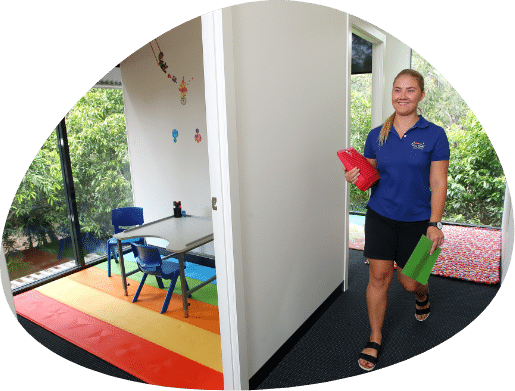Children in Care

Therapy for Children in Care
Paediatric Occupational Therapy and Speech Pathology for Children in Foster Care or Residential Care
Children in alternative care such as foster care or residential care may need some extra support learning those key life skills within self care, socialising and playing, and learning.
How our therapy supports children in care
At OCC Therapy, we’re highly experienced in supporting children who are living in, or are at risk of living in out of home care. Whether that means living in foster care, living with alternative family members, residential care, or a group home. Children who are living in care may be late to reach their developmental milestones due to some disruption in their childhood or in their routines.
These children will each have unique and specific needs. Using a trauma-informed, evidence-based, and compassionate approach, we offer both practical and developmental support to children and adolescents. We work with the child to identify their strengths and their interests and build on these to help them tackle new challenges.
How we support carers and new guardians
Working with children in care to reach their developmental milestones, establish routines, and set them up to thrive relies on having the correct strategies. We’ll work with carers or guardians to establish routines, strategies, and the resources they need to support the child.
The Key Areas Our Therapists Help Children In Care With
Self Care
Daily Routines
Here, the child will learn to structure their day and follow routine — this might include items like getting ready for school on time.
Eating
We’ll guide the child through learning to prepare their own food, use cutlery, and to expand their food preferences.
Sleep
Targeting bedtime routines here, we’ll help the child achieve a restful and quality sleep.
Dressing
This is where we’ll address those key parts of dressing independently: tying shoelaces, doing up buttons or zippers, and tolerating different clothing types.
Personal Hygiene & Safety
They’ll learn to bathe, brush their teeth, brush their hair, and use the toilet on their own. We’ll also develop key safety concepts, including helping the child identify dangers.
Independence
Whether it’s a school camp or sleepovers with friends or family, we’ll build up the child’s independence.
Learning
Memory
The child will develop their ability to remember multi-step instructions to complete tasks at home or at school.
Classroom Participation
We’ll support classroom behaviour and engagement through extension, support and specialist lessons.
Skill Development
We’ll support the development of necessary skills required for vocational work.
Attention & Concentration
Targeting their focus, we’ll develop strategies to assist and increase their concentration at home and in the classroom.
Planning & Organising
We’ll support the child to effectively plan their own tasks and organise their own work or belongings.
Functional Literacy & Writing
Using assistive technology, we’ll work with the child to build their literacy skills.
Major Transitions
Here, the child will be supported to prepare themselves and plan to transition. Whether that’s to a new grade, new school, or for completing school.
Learning Skills
The child will learn to follow instructions and initiate and complete tasks.
Daily Transitions
We’ll support the child to participate and shift between tasks in learning settings and at home.
Social & Leisure Participation
Emotional Development
This is where we’ll work with the child to identify and manage their emotions throughout the day, helping them increase their flexibility and adaptability.
Community Participation
We’ll support the child’s access to the community here. We’ll build confidence in joining activities, using public transport, safety, going to a sleepover, and eating at a restaurant.
Play & Interaction
The child will learn how to play, both independently and socially, develop their imagination, come up with ideas or stories, and to develop and maintain friendships.
Sport Participation
Here, we’ll support the child’s confidence in sport and leisure activities, as well as their gross motor skills.
Communication Skills
Speech & Language Skills
We will help your child to develop oral and written language skills as well as facilitate the use of Augmentative and Alternative Communication (AAC) if required. We will also target speech sound production.
What to Expect from Therapy
At OCC Therapy, our focus is helping your child achieve the very best outcomes, whether that means building confidence, encouraging participation, or building vital skills. Our sessions are tailored to your child. So, if they’re having difficulty at home, we’ll come work with them there, if it’s at school, we’ll partner with their teacher in the classroom.
Meeting your child where they are, we’ll build on their interests and skills. Then, we’ll shape our supports accordingly. Parents and teachers are invaluable in your child’s progress. We’ll ensure you’re involved and work as a partner in the process.
When working with teenagers, they may prefer we work around them. This means meeting and chatting strategies with others in their support network (teachers, parents, etc). This way, we can set up appropriate supports and strategies without involving ourselves directly.
This may include:
- Creating service agreements & funding arrangements with agencies
- Involvement in team meetings to support the child
- Communication and regular progress reporting
Face to face time with the child, working on specific skill development - Collaborating with parents and carers to develop strategies and share information
- Working alongside the child’s teacher, to develop a specific plan to meet their goals
- Collaborating with others on the child’s support team
Assisting with specific documentation (e.g. Centrelink or NDIS applications) - Some teenagers prefer that we work around them rather than direct involvement
- Developing specific programs, such as home based therapy programs
- Working at our clinic, your child’s school, at your home, or out in the community
